On this year’s National Indigenous Languages Day (March 31, 2025), we highlight Dr. Pat Camp’s important work in incorporating Indigenous language into culturally safe healthcare and research practices.
Dr. Pat Camp, a Principal Investigator at the Centre for Heart Lung Innovation (HLI), reflects on her research helping people manage chronic lung conditions through exercise, education, and support – a process called pulmonary rehabilitation.
Through collaboration with Carrier Sekani Family Services, Dr. Camp shares how her team is learning to respectfully incorporate Indigenous knowledge into pulmonary rehabilitation research. This includes using the Carrier (Dakelh) language to name body parts—an approach to make pulmonary rehab more culturally safe, respectful, and healing.
“There’s a lot more that we can do”
— Dr. Pat Camp, HLI Principal Investigator
Watch Dr. Pat Camp’s Story
Learn More
Learn about National Indigenous Language Day:
Other links:
New research on low-carb, high-fat diets earns a spot among the five most-read articles in one of cardiology’s leading journals.
A study led by Dr. Iulia Iatan and Dr. Liam Brunham at the Centre for Heart Lung Innovation (HLI) has been recognized as one of JACC: Advances’ Top 5 Most-Read Articles of 2024. Published in one of the most prominent cardiovascular journals, the study’s ranking underscores its impact and the global interest in its findings.
“It is an honour to see our study recognized among the most-read articles in JACC: Advances for 2024. This reflects the growing interest in understanding how dietary choices impact long-term heart health,” said lead author Dr. Iulia Iatan, a clinician-scientist and former postdoctoral fellow at UBC’s Centre for Heart Lung Innovation and the Healthy Heart Program Prevention Clinic at St. Paul’s Hospital.
“To our knowledge, this was one of the first studies to show an association between low-carbohydrate high-fat diets, increased cholesterol, and higher risk of cardiovascular events.”
— Dr. Iulia Iatan, HLI’s former postdoctoral fellow
“I hope these findings encourage both the public and healthcare professionals to consider the long-term effects of these diets, and also inform clinical practice and public awareness on the importance of heart-healthy nutrition.”
Trendy “keto-like” diet under scrutiny
Low-carbohydrate, high-fat (LCHF) diets have gained popularity for various health reasons, including weight loss and diabetes management, but their long-term effects on heart health have been uncertain. This study found that “keto-like” diets are linked to higher cholesterol levels and a twofold increase in major heart problems, including heart attacks and strokes over the next decade. The risk was highest for those with a genetic predisposition to high cholesterol.
To investigate this link, Dr. Iatan and the team analyzed data from the UK Biobank, tracking 305 participants who followed an LCHF diet—defined as <25% of daily calories from carbohydrates and >45% from fat—over an average of 12 years. They examined lipid levels and cardiovascular events, comparing outcomes to those on normal, standard diets.
A further finding from the study was that the risk of severely elevated cholesterol was highest among those individuals with an elevated polygenic risk score, suggesting a genetic predisposition to diet-induced increases in cholesterol in some people.
These findings emphasize the need for caution among followers of this dietary pattern, especially for those with high cholesterol or a personal or family history of heart disease.
What’s next?
Dr. Brunham and colleagues plan to continue examining how genetic differences influence response to various dietary patterns and their effects on heart health. Future research will also explore whether genetic testing can help create more personalized dietary recommendations and improve understanding of variations between individuals in response to different diets.
A big moment for HLI
This recognition reinforces HLI’s leadership in cardiovascular research and its role in providing strong, evidence-based guidance on health and disease prevention. With this study ranking among JACC: Advances’ most-read of the year, HLI continues to drive research that informs medical practice and public health.
“This is a great recognition of the quality of cardiovascular research taking place at HLI and our centre’s leadership in the field of lipid disorders.”
— Dr. Liam Brunham, HLI’s principal investigator
Further Reading
- Read the full study: JACC: Advances
- Check out Dr. Iulia Iatan’s CNN feature: CNN News Video
- Watch the 3-minute summary by Dr. Liam Brunham: PACE-CME Video
Media Coverage
Read our previous article on this study: ‘Keto-Like’ Diet May be Linked to Increased Risk of Heart Disease
Two HLI lung health researchers are being recognized with a prestigious national award.
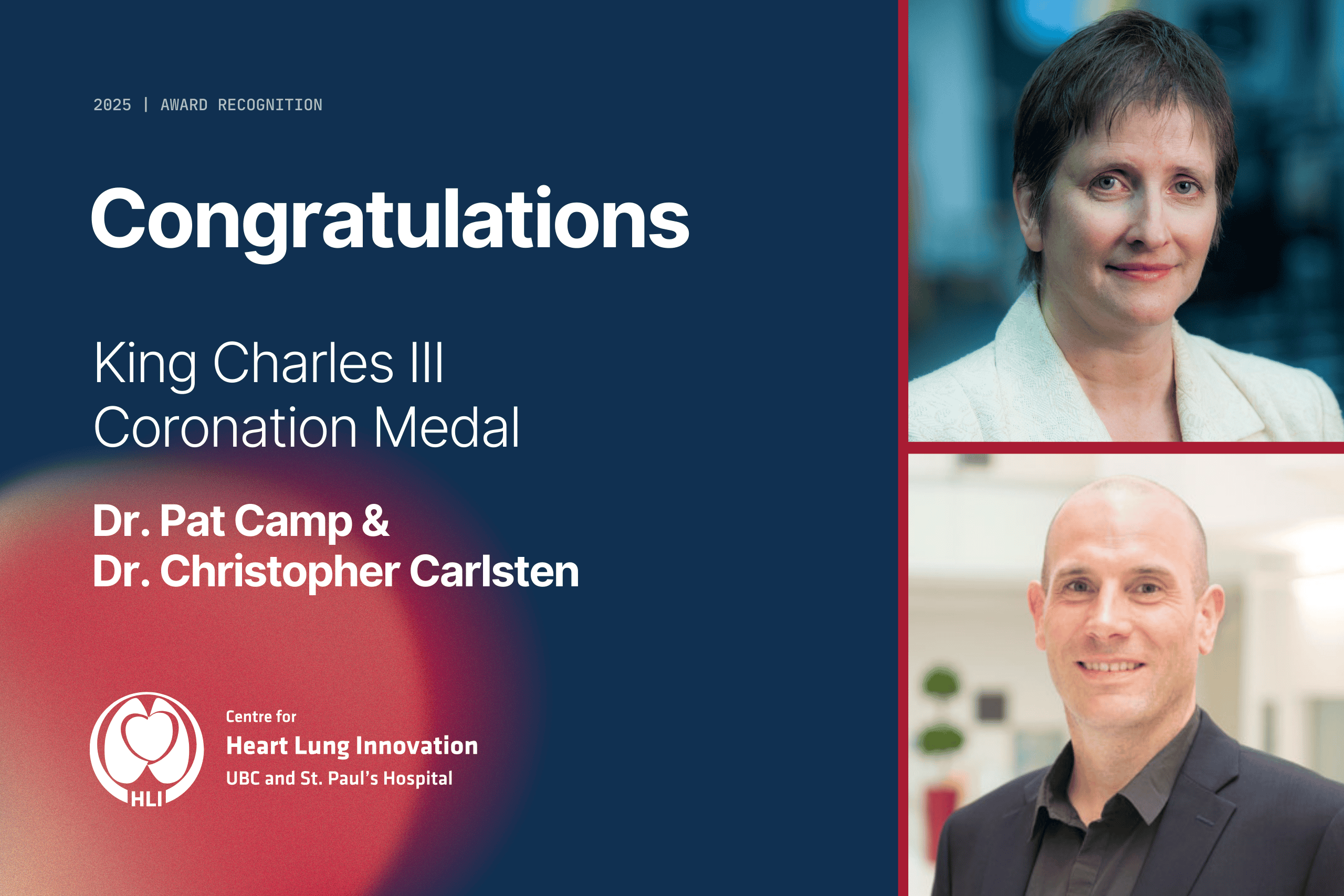
Congratulations to HLI principal investigators, Dr. Pat Camp and Dr. Christopher Carlsten, who have been honoured with the King Charles III Coronation Medal—a national recognition of their contributions to Canada and the community.
This award, the first commemorative medal marking the coronation of His Majesty King Charles III on May 6, 2023, celebrates individuals who have made a significant impact in Canada. Recipients are recognized for their work in areas that reflect values shared by both King Charles III and Canadians, including service, environment and sustainability, and diversity.
- Dr. Camp is breaking down barriers to lung health care. As a physical therapist and researcher, her work focuses on making pulmonary rehabilitation and physical activity programs more accessible, particularly for people in rural and First Nations communities. By working directly with these communities, she helps co-design programs that reflect their needs and ensure their voices are heard.
- Dr. Carlsten is exposing the dangers in the air we breathe. His research focuses on how air pollutants, like diesel exhaust, harm lung health over time, working to better understand the risks of breathing in polluted air at work or in the environment. As a clinician-scientist, he treats patients affected by workplace and environmental toxins, translating research into real-world care.
Drs. Camp and Carlsten are among 39 distinguished Canadians nominated by the Canadian Lung Association (CLA) for their outstanding contributions to respiratory health research. In British Columbia, they are two of just three recipients of this national honour.
Congratulations again to Dr. Camp and Dr. Carlsten on this well-deserved recognition!
Read More
Connect
- Dr. Pat Camp on X (Twitter): @UBCPulmRehabRes
- Dr. Christopher Carlsten’s Lab
HLI researchers receive over $1.86 million from CIHR’s Fall 2024 Project Grant competition.
The Centre for Heart Lung Innovation (HLI) is proud to celebrate the achievements of 3 principal investigators who have been awarded funding through the Canadian Institutes of Health Research (CIHR) Project Grants, Fall 2024 competition. This funding will drive innovative research in cardiovascular health, infection and immunity, and transplant medicine, advancing scientific discovery and improving patient outcomes.
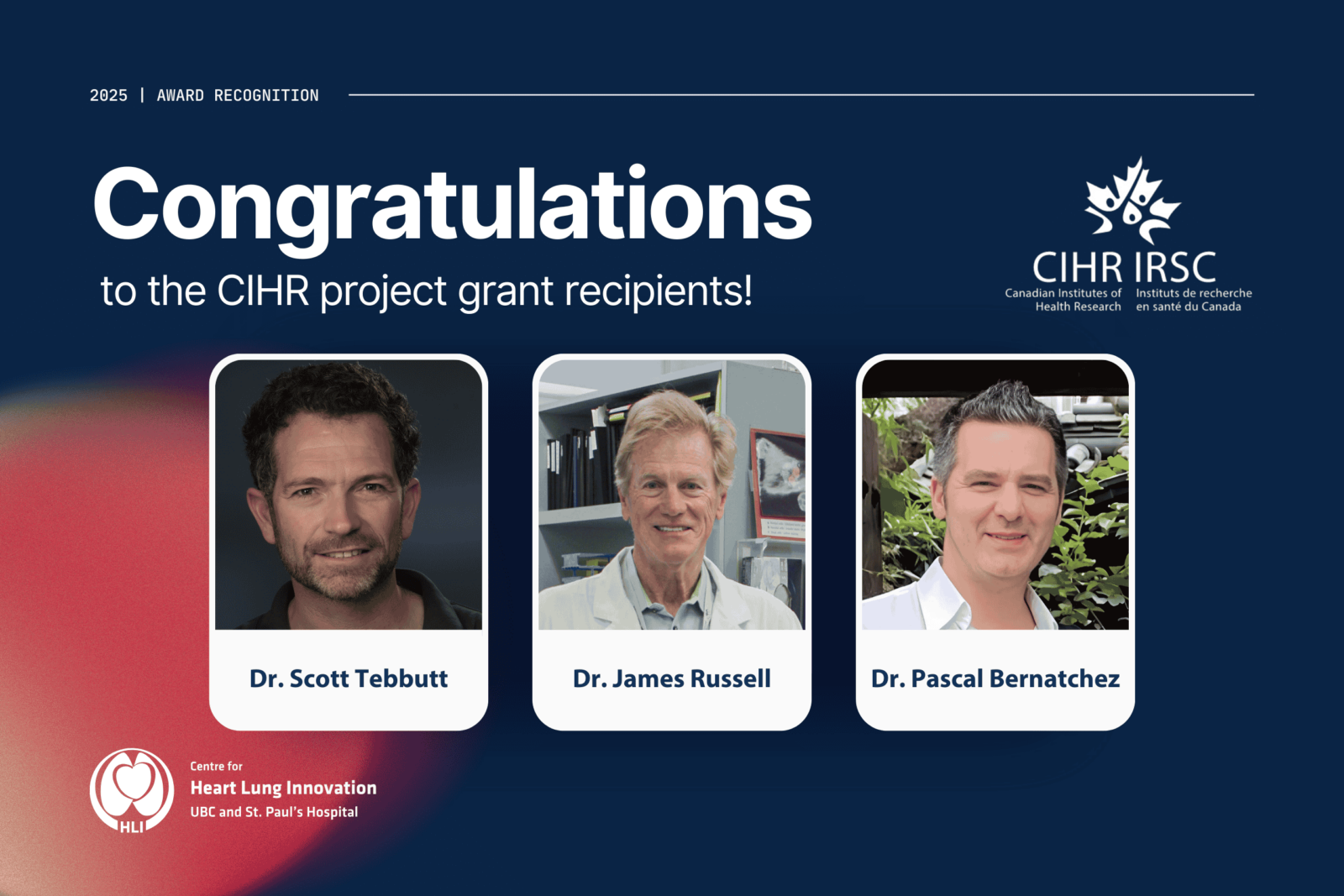
Congratulations to the following recipients:
Dr. Scott Tebbutt – $229,500
Metabolomic biomarkers for early detection of acute cellular rejection in heart transplant recipients (HLI Co-investigator: Dr. Chengliang Yang) – CIHR Link
For people with severe heart failure, heart transplantation is a life-saving surgery. However, the body’s immune system may attack the new heart in a condition called acute cellular rejection (ACR). Currently, detecting ACR requires invasive biopsies.
Dr. Scott Tebbutt and HLI Co-investigator Dr. Chengliang Yang are looking into non-invasive blood tests to identify ACR after patients undergo a heart transplant surgery. The development of this test could help doctors quickly identify and treat rejection, improving the health of heart transplant recipients.
Dr. James A. Russell – $719,101
Development of Lipid nanoparticle RNA systems as novel therapeutics for endotoxemia resulting from severe bacterial infections – CIHR Link
Severe bacterial infections, which can lead to pneumonia and sepsis, are leading causes of death worldwide. While antibiotics are essential, some bacteria develop resistance (“superbugs”), making infections harder to treat.
Dr. James A. Russell’s team is developing RNA-based drugs that work by blocking harmful genes or boosting the body’s defenses during infections. These next-generation drugs delivered using lipid nanoparticles, a safe delivery vehicle, could enhance the body’s ability to fight infections, working alongside antibiotics to improve treatment outcomes.
As a commercialization grant, inventions can be patented (IP) and then transferred (“licensed”) to a company called Resolve Nanotherapeutics, that will drive clinical development of these urgently-needed drugs for severe infections.
Dr. Pascal Bernatchez – $914,175
Activation of the chronic endothelial function reserve for the prevention and regression of aortopathies (HLI Co-investigator: Dr. Scott Tebbutt) – CIHR Link
Aortopathies are a group of diseases that affect the aorta, the largest blood vessel in the body. These conditions can weaken the aorta’s walls, increasing the risk of life-threatening conditions like tears and aneurysms (ballooning of the vessel). While patients are often given medication to lower blood pressure to reduce the damage, these treatments do not always stop the disease from progressing.
Dr. Pascal Bernatchez and HLI co-investigator Dr. Scott Tebbutt are researching how to activate natural defenses of blood vessels to improve vessel health in aortopathies. Their previous studies suggest that increasing nitric oxide levels—a chemical released naturally in response to blood flow—may better protect blood vessels. They aim to study this further and are also working to develop blood biomarkers that can indicate whether a patient’s treatment is effective. This approach would offer a more precise way to monitor and personalize care.
We congratulate all the awardees on this well-deserved recognition and look forward to seeing their contributions to advancing health research.
Each summer, HLI welcomes undergraduate, co-op, and high school students to explore cardiovascular and pulmonary research. For many students, this program provides an invaluable first-time opportunity to learn practical laboratory techniques and to take a first step toward a career as a scientist. Towards the end of the summer period, students are given an opportunity to showcase their novel research in front of a scientific and general audience. For many undergraduate and young trainees, this summer experience is their first time attending and presenting at a public research conference.
In 2020 and 2021, the centre used Zoom and Gather to allow both summer students and graduate and postdoctoral trainees to present their research. Over the course of 5 days, attendees watched oral and poster presentations, and research awards were handed out for a wide array of research topics: the microbiome and asthma, lipid nanoparticles for atherosclerosis therapy, gene expression analysis in lung fibrosis, COVID-associated cardiac injury, and modeling arrhythmias with stem cells. In 2022, the centre returned to hosting a one-day, fully in-person Research Day. Timothy Caulfield, a Canada Research Chair in Health Law and Policy at the University of Alberta, delivered the Bruce McManus Lecture: “Battle Bunk: It works! It’s needed.” His interest in research ethics, public health, and science, and straightforward style have made him well known in popular media. The #ScienceUpFirst social media initiative, which he co-founded, formed the crux of his talk on the importance of debunking misinformation. Later in the day, attendees learned about knowledge translation and science communication from a panel of experts from Michael Smith Health Research BC (Kevin Sauvé and Dr. Stirling Bryan, Ph.D.), SFU (Dr. Tania Bubela, Ph.D.), and UBC (Dr. Jillianne Code, Ph.D.). The panelists discussed the imperatives of mobilizing new knowledge gained from research and building patient-oriented learning health systems, and the impact of social media on student success and well-being. Oral presentation awards were given to the following trainees: Michelle Fan, Phoebe Lu, Hattie Luo, Meng Wang, and Keith Wu. Poster presentation awards were given to: Joshua Matsui, Nicole Coxson, Tony Guo, Cara Kovacs, Jinelle Panton, Kauna Usman, Morgan Flynn, Harjot Bhandol, and Estefanía Espín.
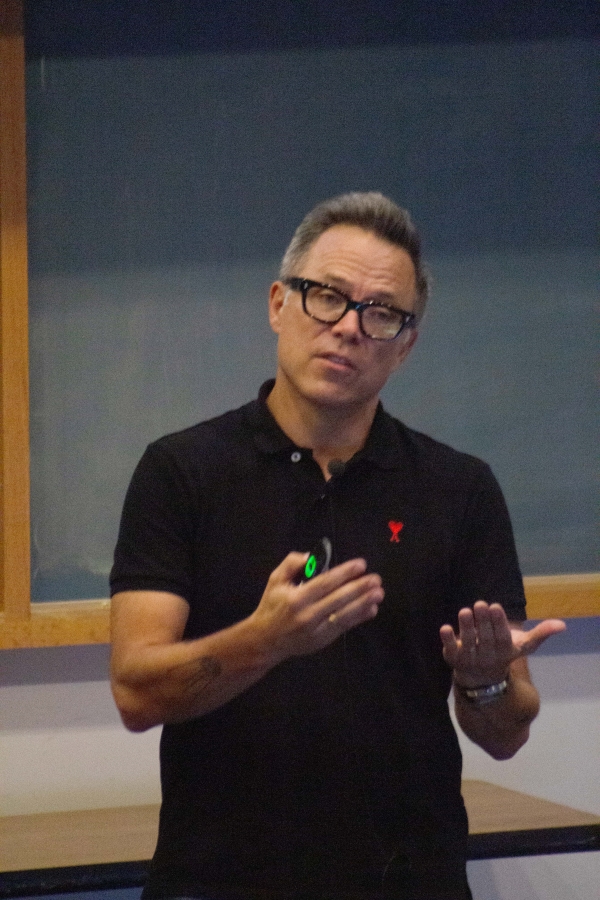
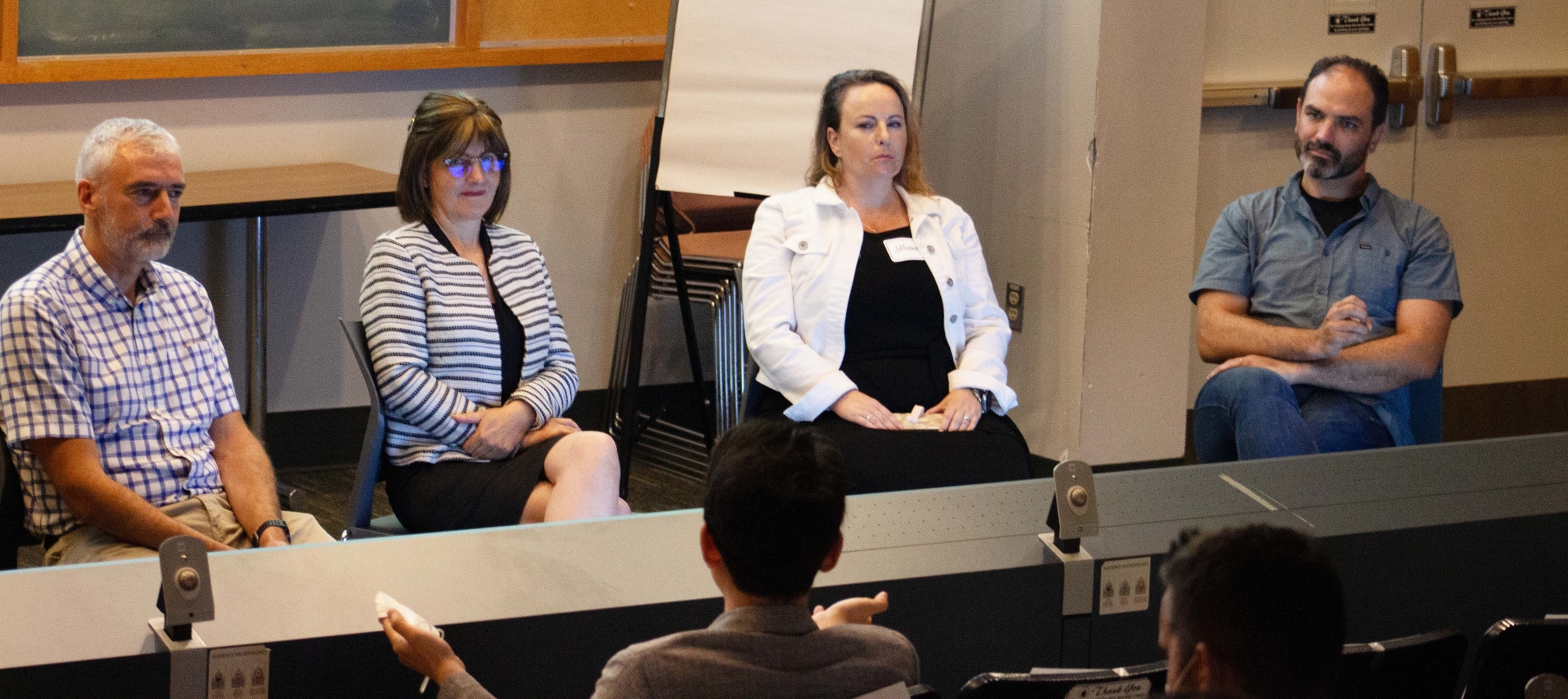
This year, the Trainee Association at the Centre for Heart Lung Innovation (TAHLI) again hosted the annual Research Day on August 19th at the Cullen Theatre in St. Paul’s Hospital. With over 100 people in attendance, 12 students presented their project in oral format and 36 showed their project in poster format. Ten students also took on the novel challenge of giving knowledge translation rapid fire talks, which involved condensing their research project into a one-minute oral presentation. There was a wide range of research topics ranging from cardiovascular health, exercise and sepsis, and mechanisms of viral myocarditis to lung fibrosis treatments and better understanding lung disease.
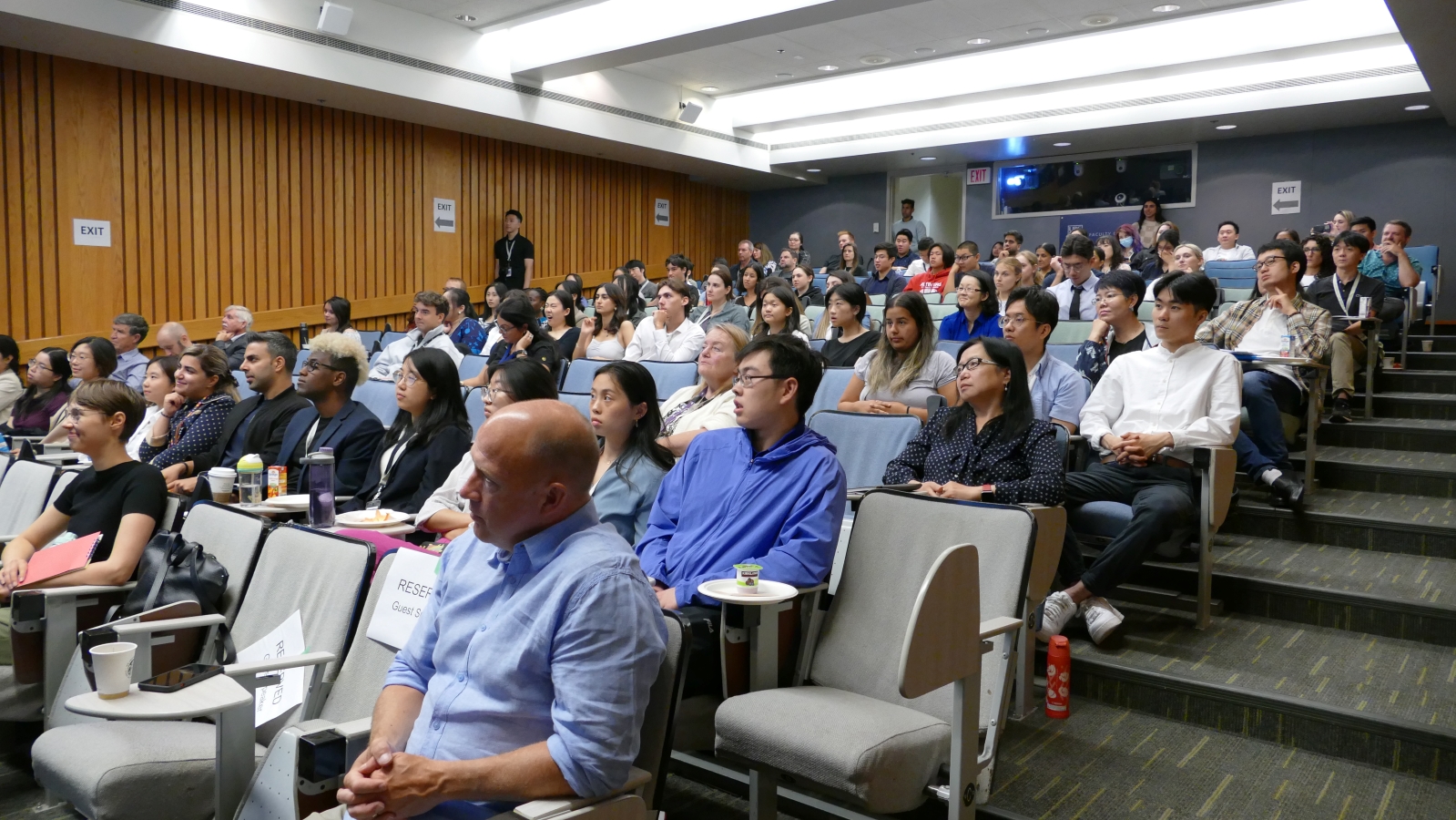

Throughout the day, trainees and attendees had the opportunity to hear from three speakers who shared career advice and insights from their outstanding research. Dr. David Granville, Ph.D., Professor in the Department of Pathology and Laboratory Medicine, gave the opening remarks and shared his knowledge of the job opportunities in BC’s life sciences sector. Since 2003, Dr. Granville has not only been an investigator at HLI, VCHRI and ICORD, but he has also served in executive roles at VCHRI and UBC. The perspective he shared on scientific careers in BC was not purely from the standpoint of an academic. Dr. Granville’s own career has been shaped by his experiences in local industry (1994-2001 at QLT) and as co-Founder and CSO of viDA Therapeutics. His message to attendees was that BC’s life sciences sector is at a very exciting moment in time. The sector is growing but the biggest challenge (and imperative) is to foster and retain local talent. In essence, universities, industry, government, and the nonprofit sector have vital roles to play in ensuring that talent, discoveries, and research and development in BC spur the growth and success of the local life sciences sector.
Next, Dr. Jennifer Gardy, Ph.D., Deputy Director, Surveillance, Data, and Epidemiology, presented the Bruce McManus Lecture: “What can BUGS in BUGS teach us about career paths?”. First, Dr. Bruce McManus (Professor Emeritus) forcing himself to stick to a single PowerPoint slide regaled the audience with stories about HLI and of course one of his “scikus”. Dr. Gardy is a well-known name in the STEM and science communications communities. She was the Canada Research Chair in Public Health Genomics at the BC Centre for Disease Control before becoming the Deputy Director, Surveillance, Data, and Epidemiology at the Bill & Melinda Gates Foundation. Hosting CBC’s The Nature of Things and Discovery Channel’s Daily Planet, Dr. Gardy has become most well-known for talking about her passion for science, epidemiology, and infectious disease. In her talk, she gave an overview of malaria around the world and how she is tasked with funding the promising science and technology that can track and prevent the disease. She discussed the incredible research that is being funded and highlighted her own research experience in genomics, disease modeling, and social sciences. Dr. Gardy showed how careers are shaped by twists and turns. Her own multifaceted career in academia, journalism, philanthropy, and global health has allowed her to interact with public health agencies, academics, and the biotech professionals. Through all these experiences that are clearly rooted in a love of science, she has been a champion for science literacy and knowledge.
After oral presentations and lunch, Dr. Karen Cheung, Ph.D., Professor in the Department of Electrical and Computer Engineering at UBC, gave the Peter Paré Lecture on “Organ-On-Chip for Physiology and Development of New Therapies.” Dr. Cheung is a Professor in the School of Biomedical Engineering (SBME) and Department of Electrical and Computer Engineering at UBC. She is also the Director of the SBME Graduate Program, a new and growing program at UBC, and an associate member at HLI. Dr. Cheung’s group (the Bio-Medical Micro Devices Laboratory) has been pursuing cutting-edge research in the field of organs-on-chip. The concept behind these engineered tissues is that specific cells and the surrounding matrix assemble in such a way that they mimic the architecture of the native tissue. Relevant to the research in lung disease at HLI is her group’s development of microfluidic airways-on-chip. With the use of very small channels, their system exposes lung airway-specific cells to environmental factors. Through collaboration with HLI researchers (Drs. Sin and Hackett and Dr. Carlsten), Dr. Cheung gave an overview of the design of this system and preliminary experiments and results applying it to study lung disease. The development of microtissues to model a disease is just one step though. The engineering and research presented by Dr. Cheung all point to the exciting future potential for therapeutic testing in several biomedical applications.
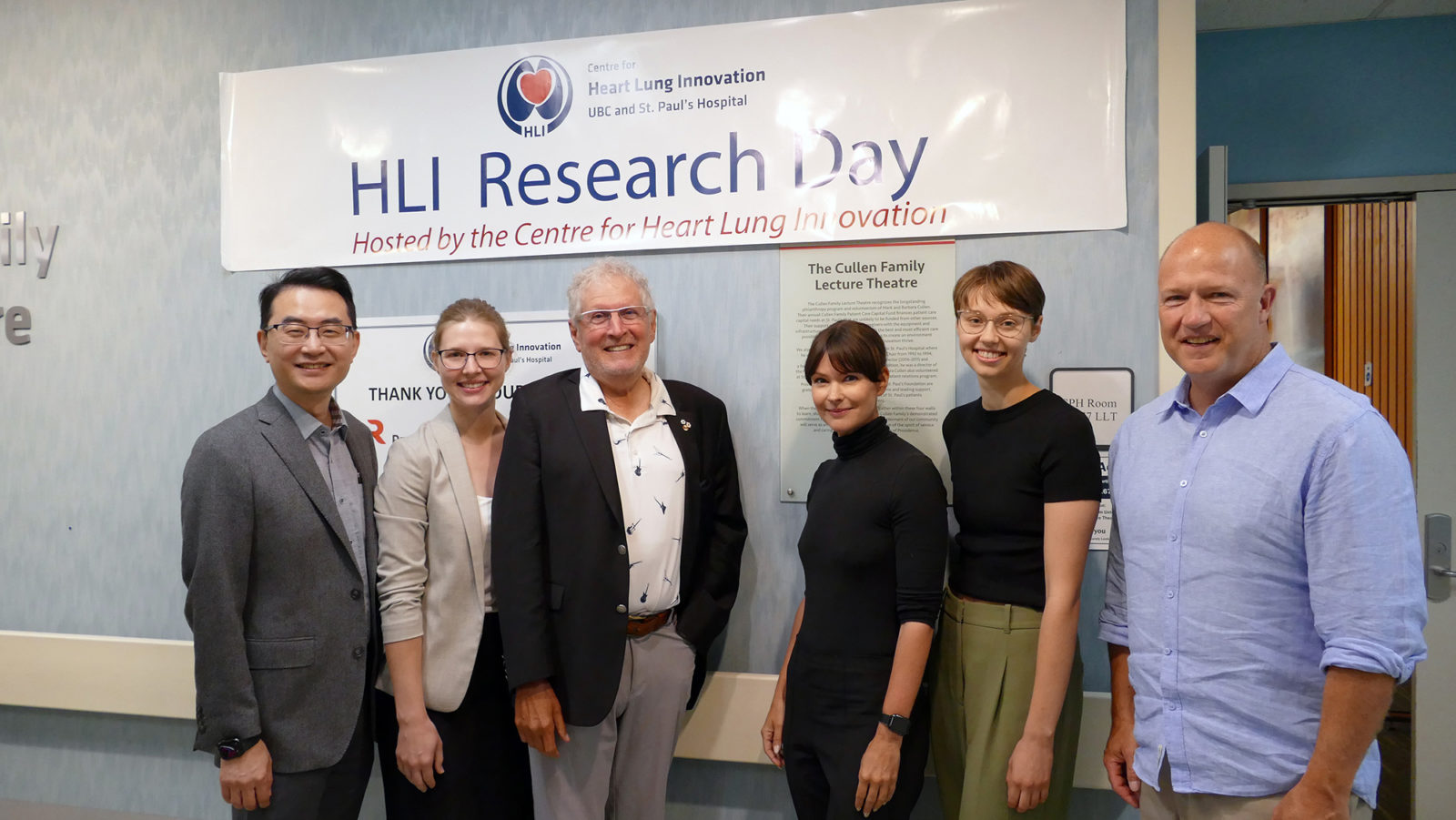
In the afternoon, there were more oral presentations by trainees, and at the end of the day the following trainees were recognized for their outstanding presentations:
The Peter D. Paré High School Student Award was given to Anna Kovtunenko to recognize her outstanding talents as a future scientist. Anna was awarded $2000 to support her research in the Hackett Lab.
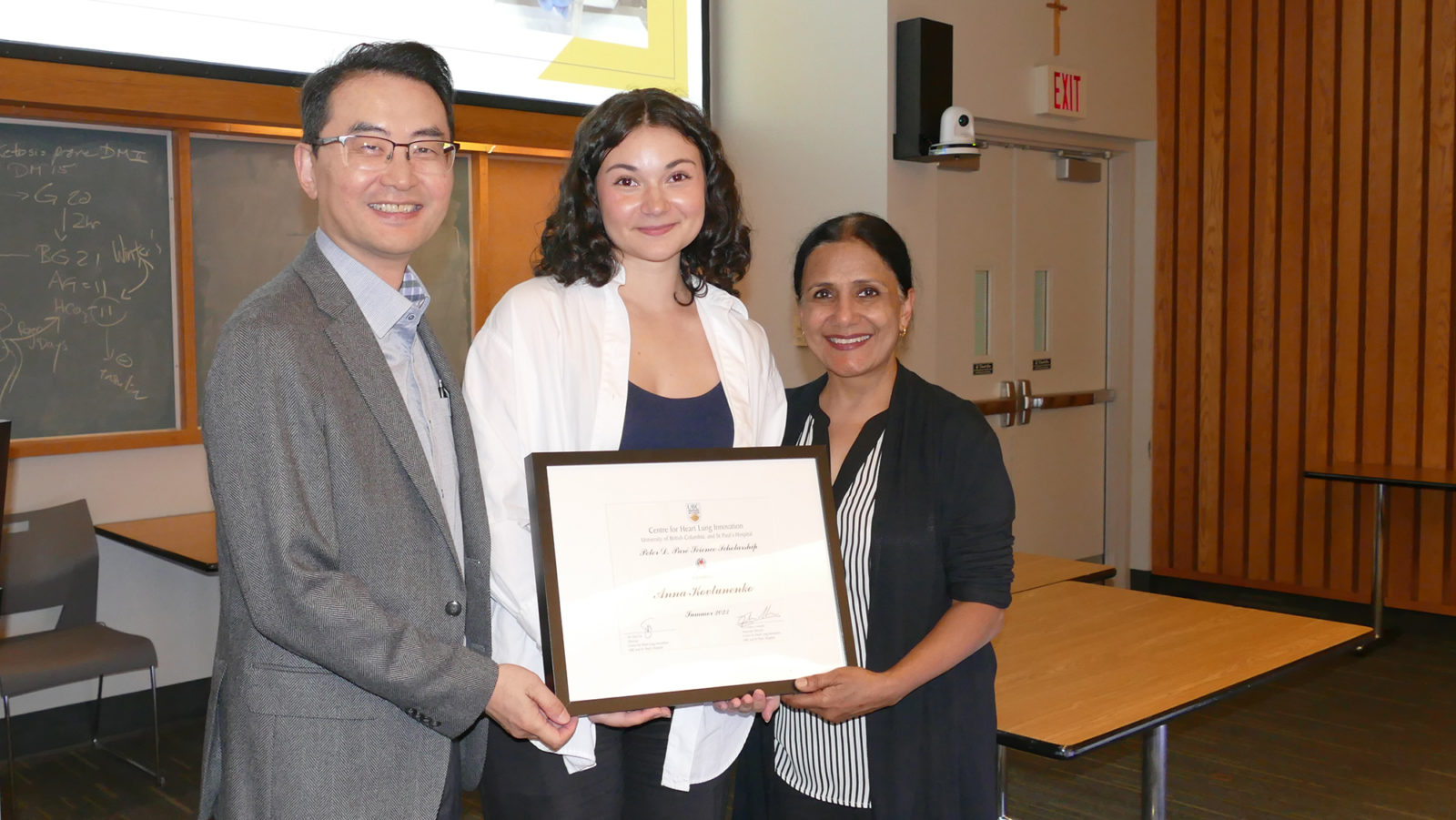
Poster Presentation Winners:
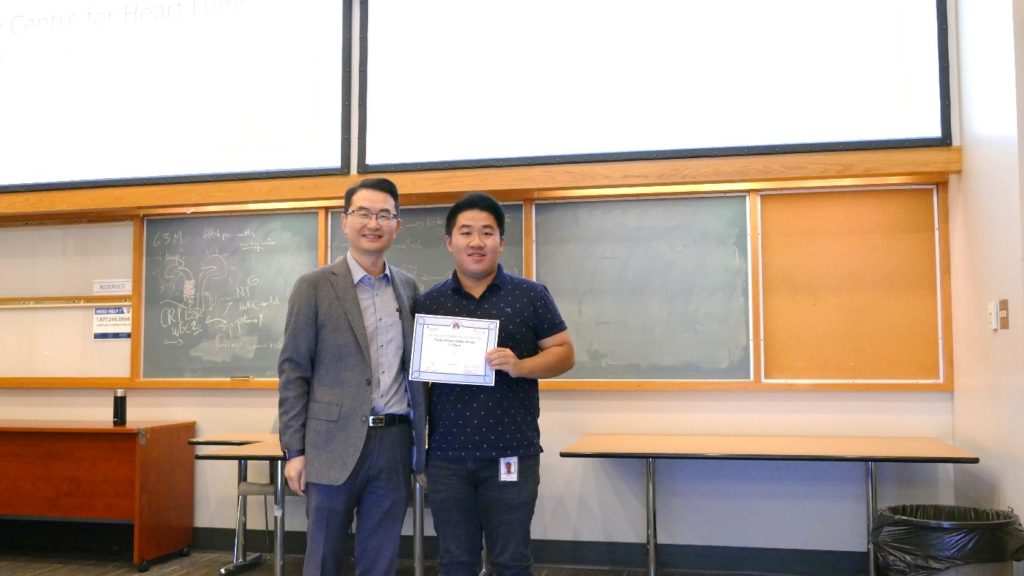
1st place poster presentation – Christopher Yuen – Early Endothelial Function Activation by Losartan Prevents Aortic Stiffness in a Model of Type 1 Diabetes
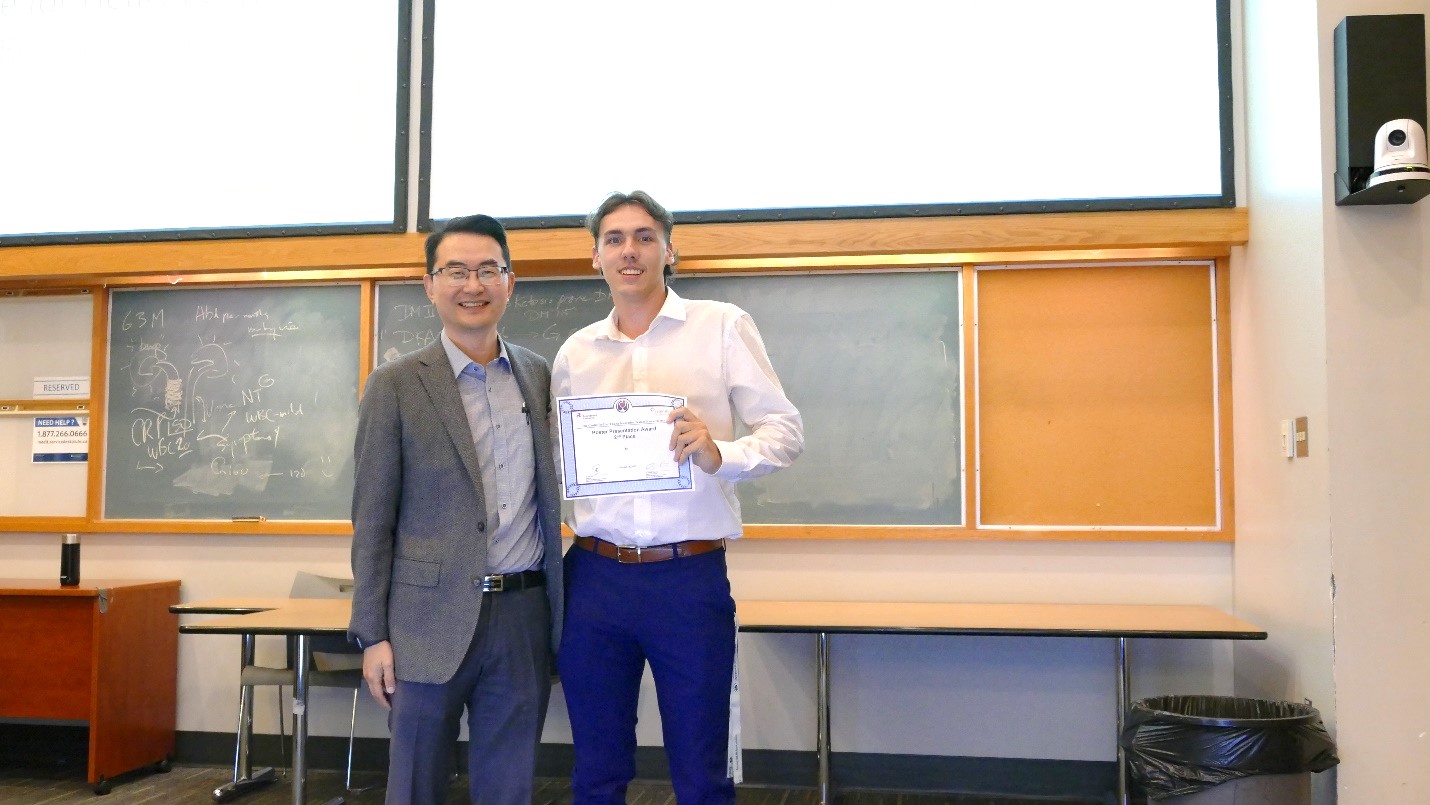
2nd place (tie) poster presentation – Tucker Reed – Impact of Bioprosthetic Surgical Valve Degeneration on True Internal Diameter
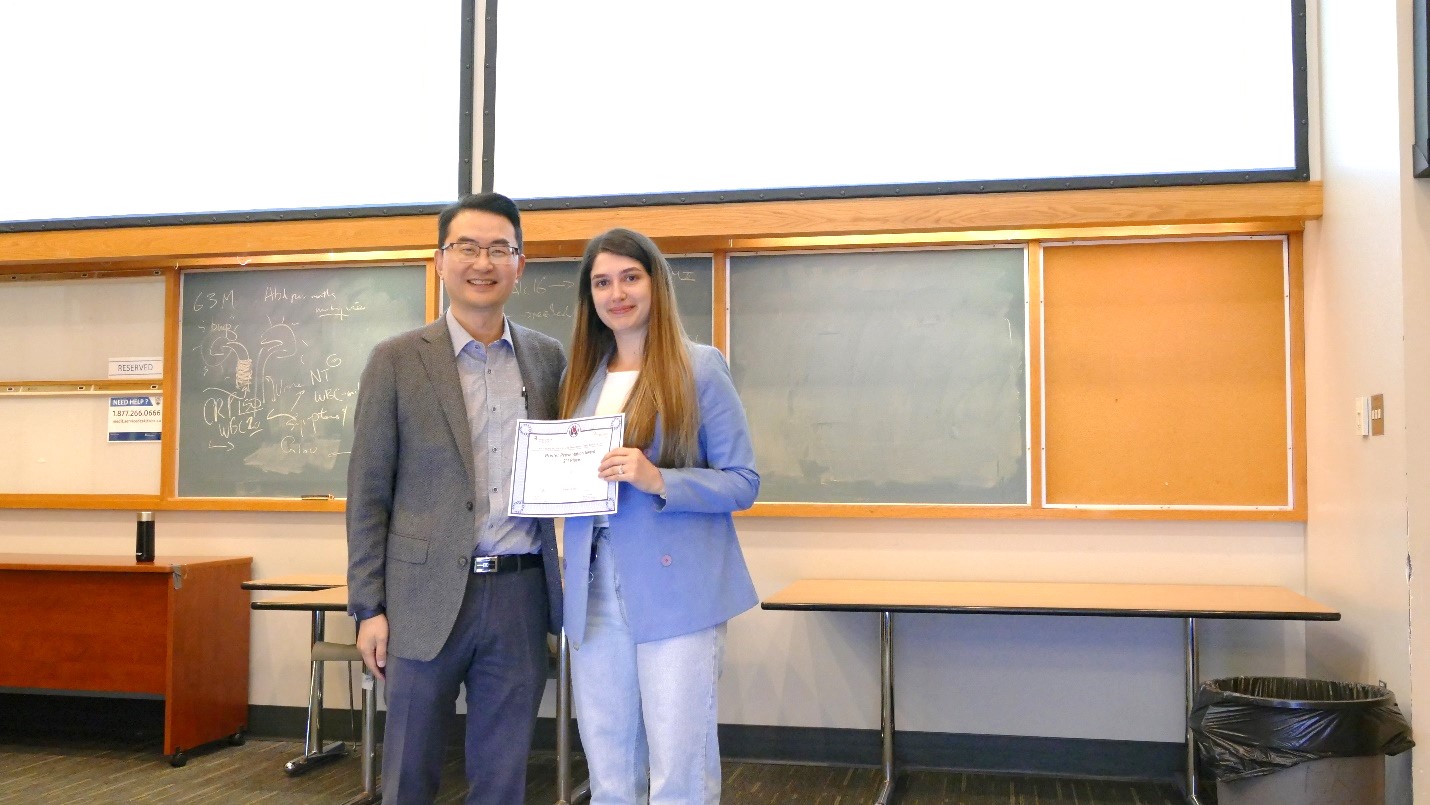
2nd place (tie) poster presentation – Fatemeh Aminazadeh – Investigating the Contribution of Sex Differences to Small Airways Disease in COPD Using Ultrahigh Resolution Imaging
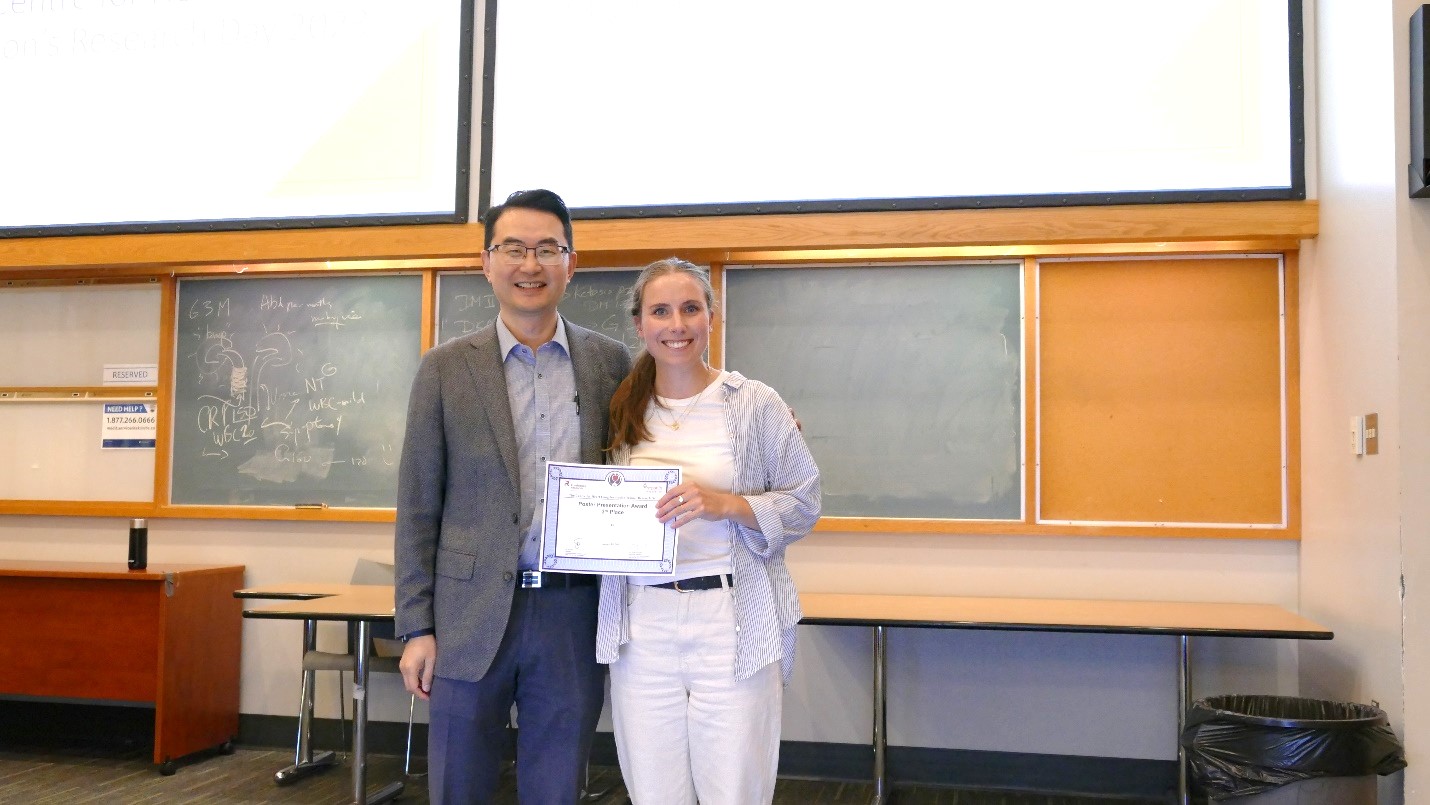
3rd place poster presentation – Sarah Bradwell – Peak ICU Performance Status and Long-Term Outcomes in Critical Care Survivors
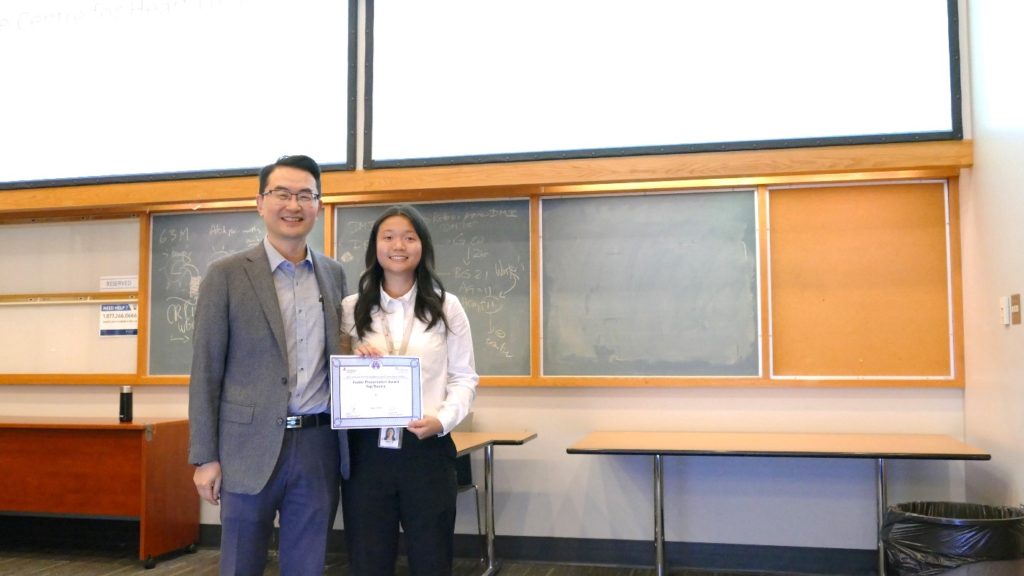
Rookie poster presentation – Janette Chen – CanCOLD Re-Visit: Changes In Protocol To Address New Questions
Oral Presentation Winners:
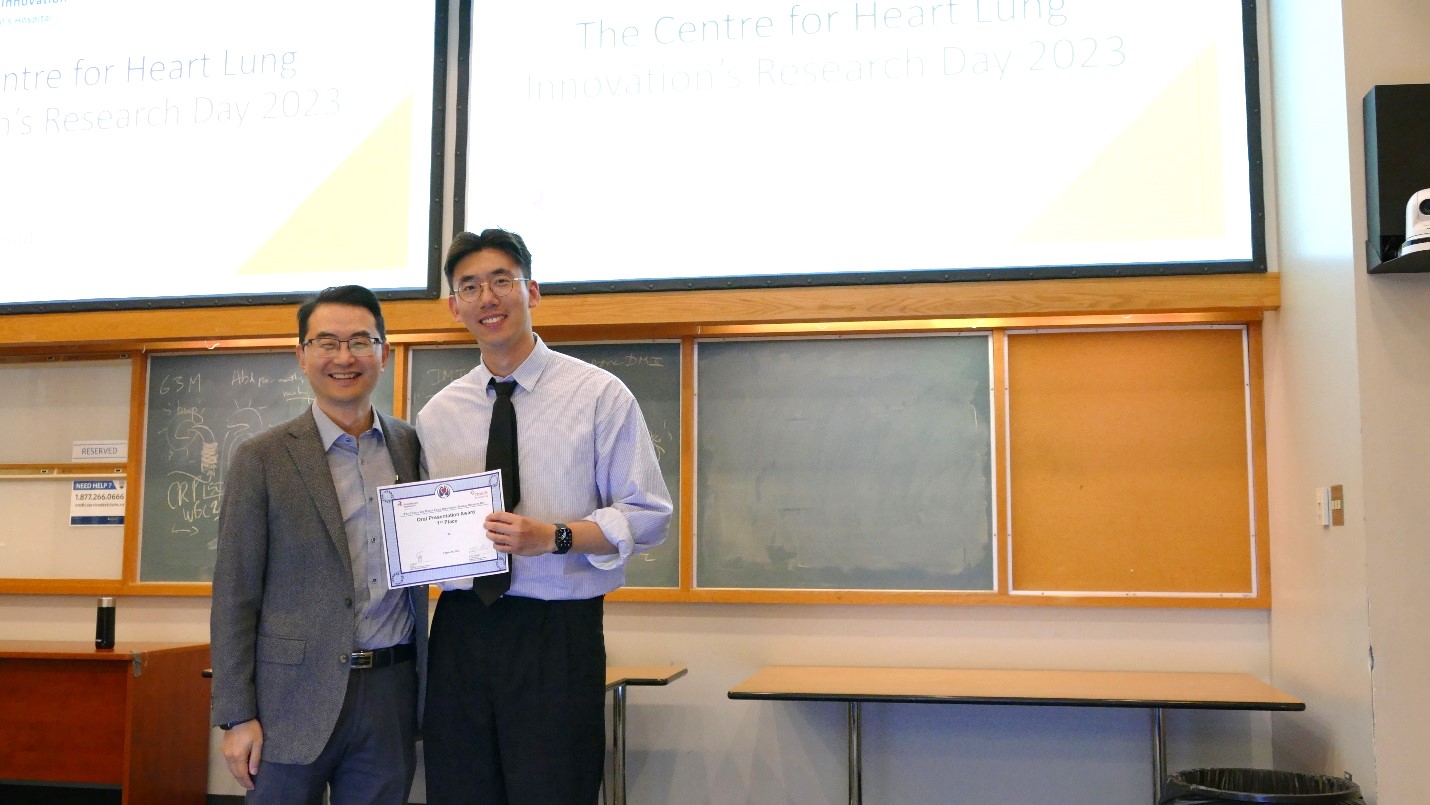
1st place oral presentation – Zeren Sun – Of Mice and Men: Tweaking Rodent Lipoprotein and Cholesterol Metabolism to Better Mimic Human Muscular Dystrophy
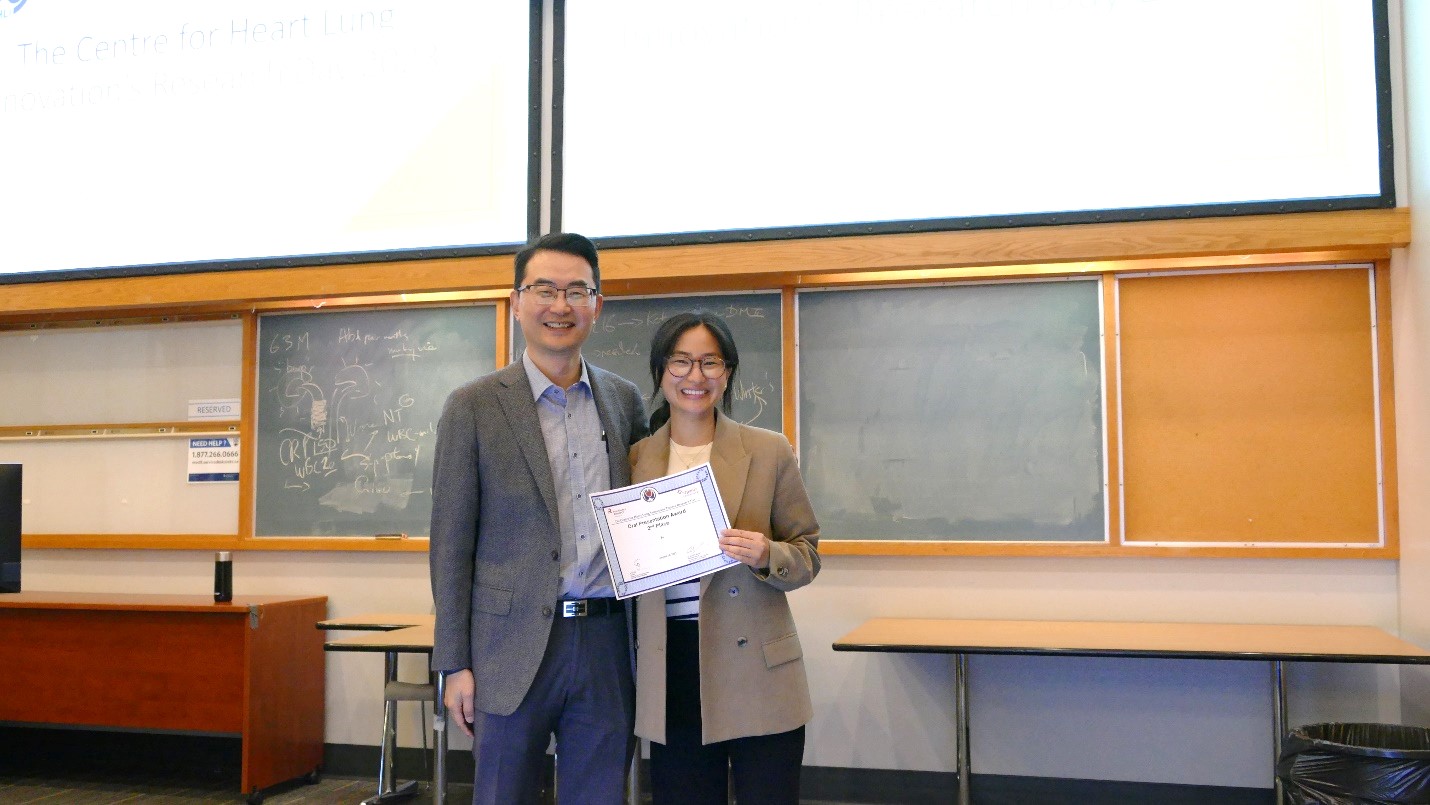
2nd place oral presentation – Aileen Hsieh – Mucus Plugged Airways in Asthma are Marked by Prominent Airway Remodeling
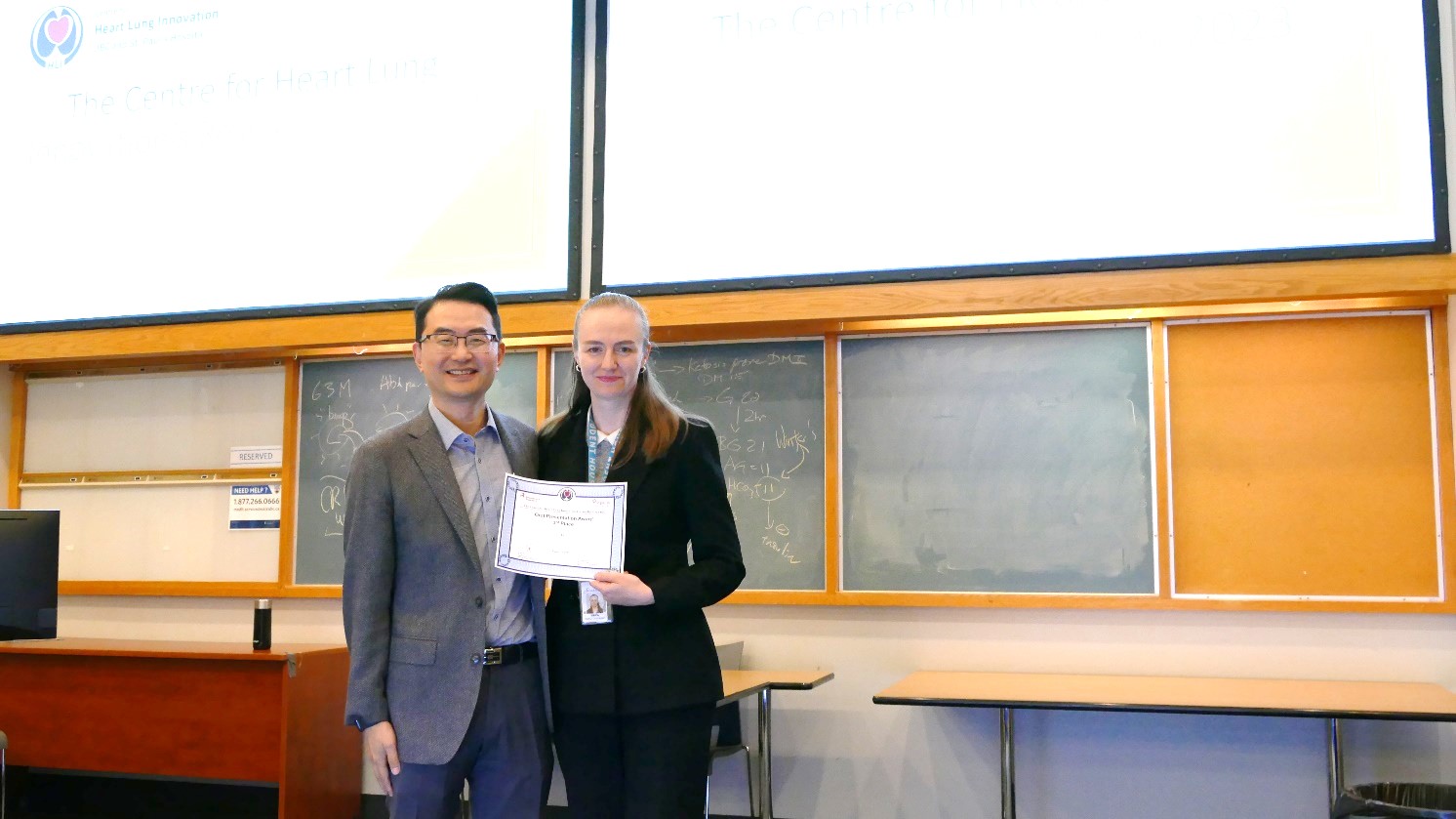
3rd place oral presentation – Maria Elishaev – Using a Novel Multiplex Imaging Platform to Visualize Inflammation and Cell Death in Human Atherosclerotic Lesions
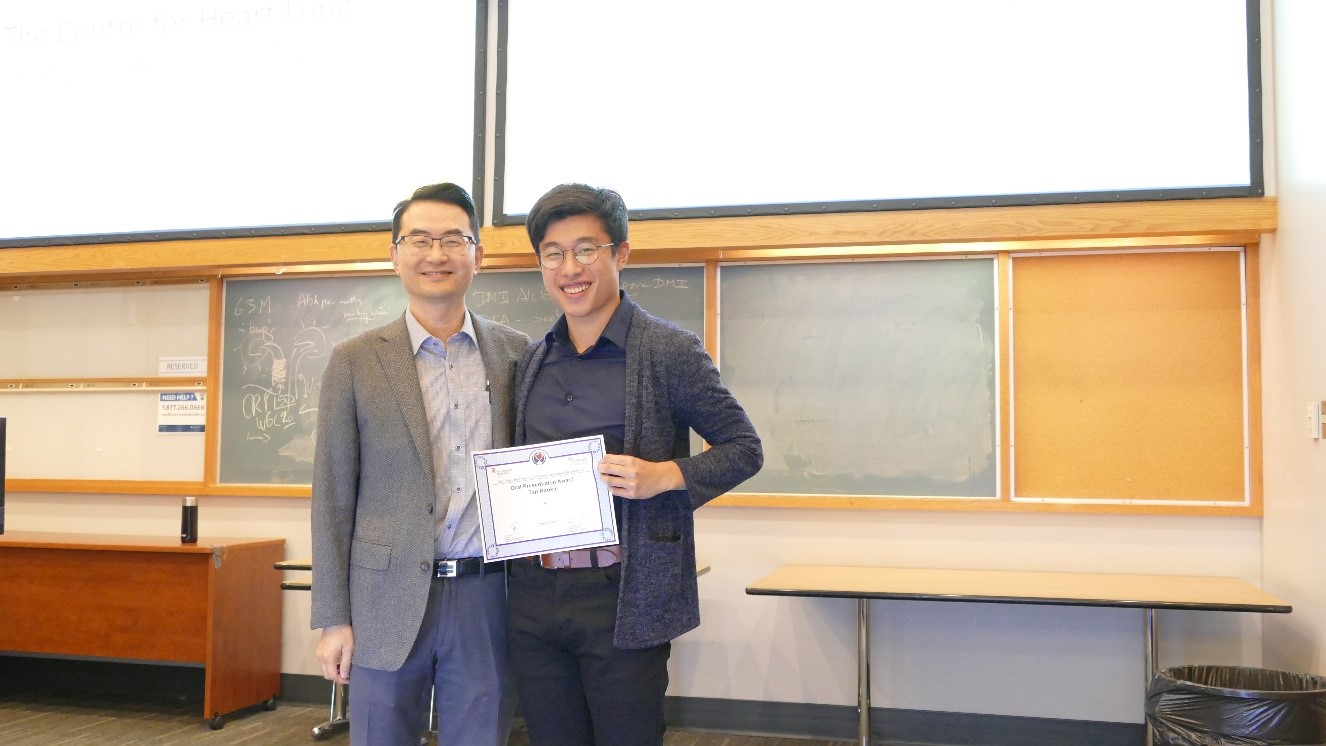
Rookie oral presentation – Samuel Leung – Spatial Gene Expression Methods for Cross-sample Analysis and Quality Control
Knowledge Translation Rapid Fire Presentation:
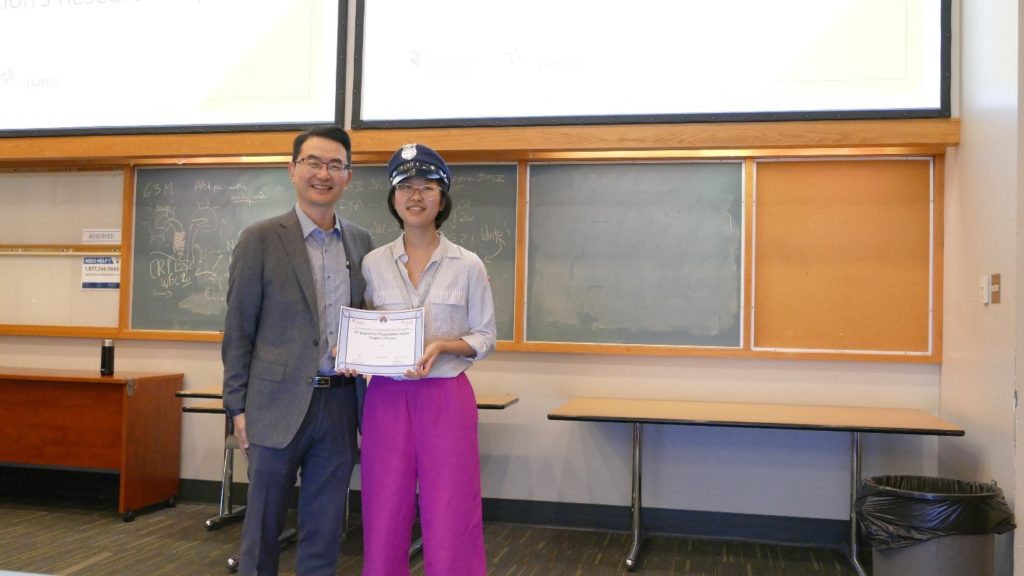
People’s Choice Award – Wendy Hwang – Understanding the Role of Complement Regulator Proteins in CVB3 Induced Myocarditis
“This is the best Research Day I have attended,” commented Dr. Don Sin, the director of HLI, at the end of the day. On behalf of the Research Day Organizing Committee, we would also like to thank the St. Paul’s Foundation and Providence Health Care for their generous funding to support our Research Day event. We hope all the attendees enjoyed the day and we look forward to welcoming everyone again next year.
Research Day would not be possible without the hard work of TAHLI, which includes undergraduate students, graduate students, and postdoctoral fellows at HLI. TAHLI aims to enhance the academic experience of all trainees by providing an environment to foster enhanced collaboration, education, professional growth, and career success. Currently, it is working on hosting professional development, wellness, and technical training workshops to support trainees throughout their academic careers.
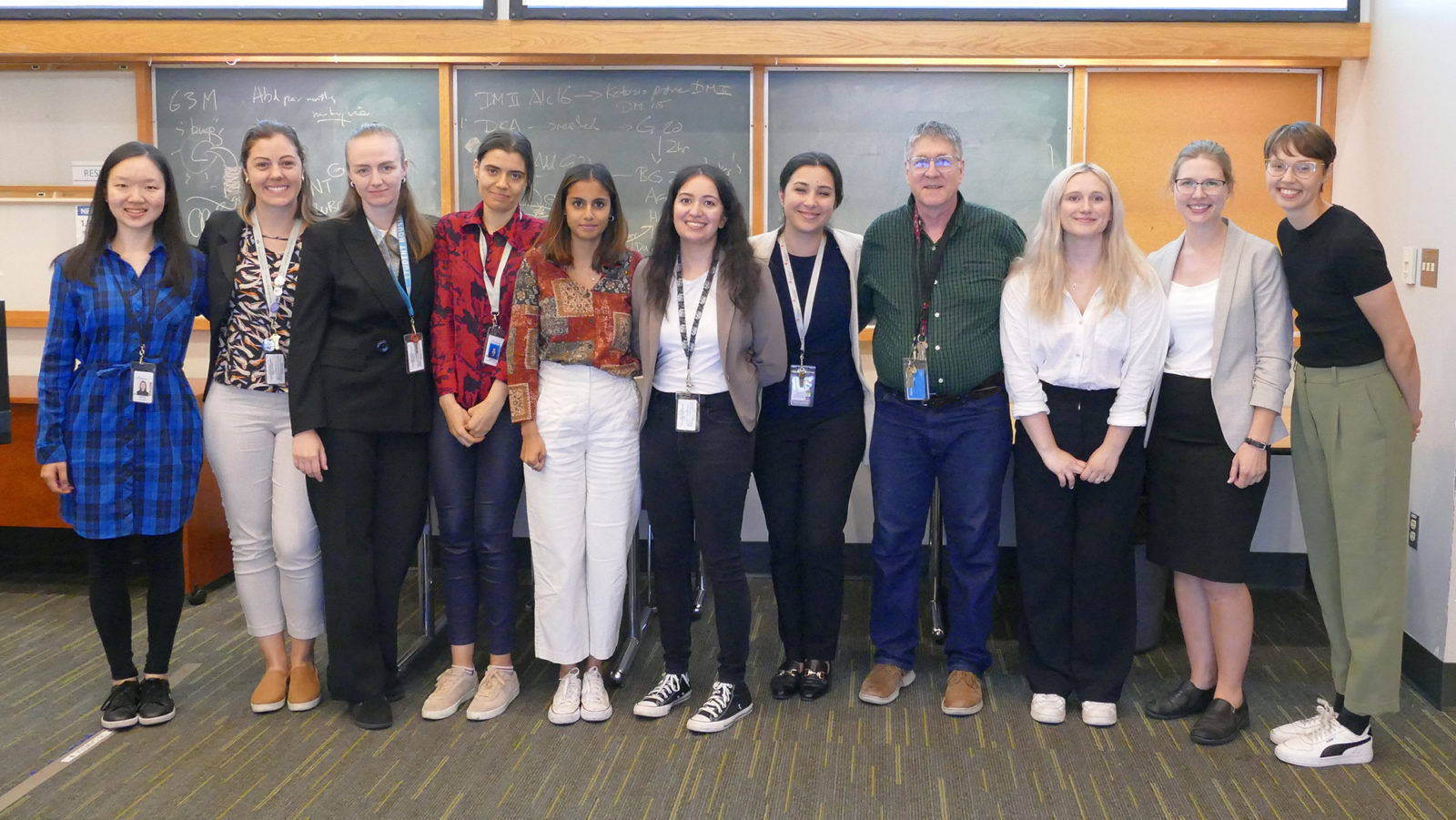
TAHLI regularly seeks student input on ongoing projects at HLI and welcomes HLI trainees at all levels to join. TAHLI is currently led by co-Chairs Katrina Besler, an M.D./Ph.D. candidate studying atherosclerosis in the Francis lab, and Naomi Potter, a Ph.D. candidate studying cystic fibrosis in the Quon lab. Whether you are interested in a big or small role, feel free to email Katrina (Katrina.Besler@hli.ubc.ca) or Naomi (Naomi.Potter@hli.ubc.ca).
In 2021, the Centre for Heart Lung Innovation (HLI) and its partners from Providence Health Care (PHC) and the University of British Columbia (UBC) created a new training initiative for graduate students and postdocs in health research. Supported by UBC funding, the program aimed to equip students with the basic tools and skills to engage and communicate with anyone who could benefit from knowledge of their research. This would allow students to properly design, implement, and translate their research into real-world practices.

Throughout 2022, this new Knowledge Translation and Mobilization (KTM) Training program consisted of webinars and workshops, a Three Minute Thesis (3MT) Competition in the Health category, a Patient & Public Forum, and presentation coaching sessions. Trainees developed the know-how to describe their work in lay terms, engage and partner with stakeholders, interact with patient and public groups to solicit feedback on their research projects, and create a knowledge translation and mobilization plan to publicize their findings for non-scientific audiences.
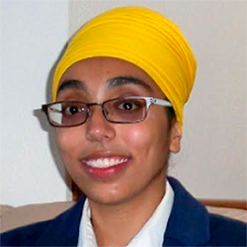
“It has been an incredible journey collaborating with trainees, faculty, patients, health system partners, HLI, and UBC to co-design, deliver, and evaluate this unique KTM program. The training has underscored the importance and value of engaging patients and other partners, as well as creating opportunities to foster a KTM culture in trainee environments. This initiative has shown great potential for building KTM capacity at HLI and beyond.” – Gurprit Randhawa, KTM Program Coordinator
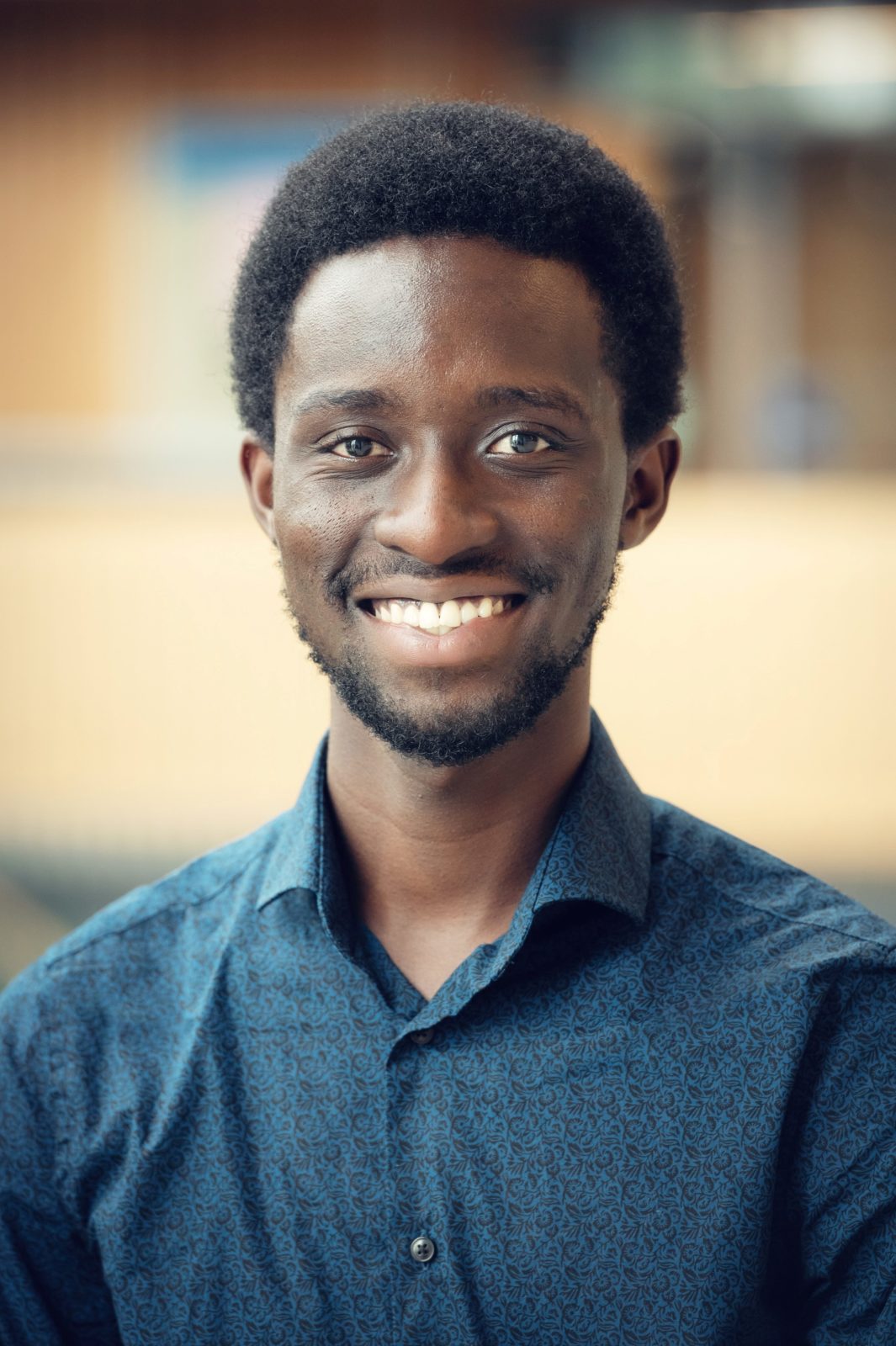
“The KTM training program was a remarkable opportunity to expound the vital role of engaging patients and other non-academic stakeholders through all parts of the research process. It was incredible to not only deliver seminars, coaching and a three-minute thesis competition, but also to evaluate the program and demonstrate its utility. This program was an important step towards incorporating KTM into research practice and training.”
— Juma Orach, PhD Student and KTM Program Assistant
To understand the impact of this initiative, Gurprit Randhawa, KTM Program Coordinator, and the project team conducted a study on this KTM “intervention”, gathering feedback from attendees, patients and the public, as well as workshop facilitators. Through a combination of surveys and focus group interviews, trainee and faculty participants reported high satisfaction with the training sessions, noting in particular the benefits of featuring a panel of experts on a specific topic. The project team included research assistants Juma Orach and Naomi Potter, patient partner Larry Worfolk, principal investigator Scott Tebbutt, and interdisciplinary steering committee members from PHC, HLI, and UBC (Aggie Black, Vivienne Chan, Jacqui Brinkman, Hélène Côté, Darryl Knight, and Ivan Leversage).
The Patient & Public Forum turned out to be mutually beneficial for both patients and trainees.
“Wow, I’ve been waiting for this day for years, right? To, to talk to people who are actually doing heart research about prevention of heart disease. And it’s like, whoa this is about time, this is excellent… I was very happy and I felt heard.” – Patient Participant
“The Patient Public Forum was my favorite thing ever… the questions coming from the patients were like, not what I expected. The things that they cared about were not what I expected. And I think it just means like ‘Okay, you got to have those conversations’ and I really appreciated the experience with being able to do that.” – Trainee Participant
Based on the feedback, this KTM intervention was shown to be effective in improving KTM competencies in trainees, and allowed researchers to foster important partnerships with patients and the general public, who were interested in research and new developments in heart and lung health. This program can be easily adopted by other post-secondary institutions to train students in KTM, empowering them to succeed after graduate school and become the next generation of scientific experts.
This study was published in Implementation Science Communications.
